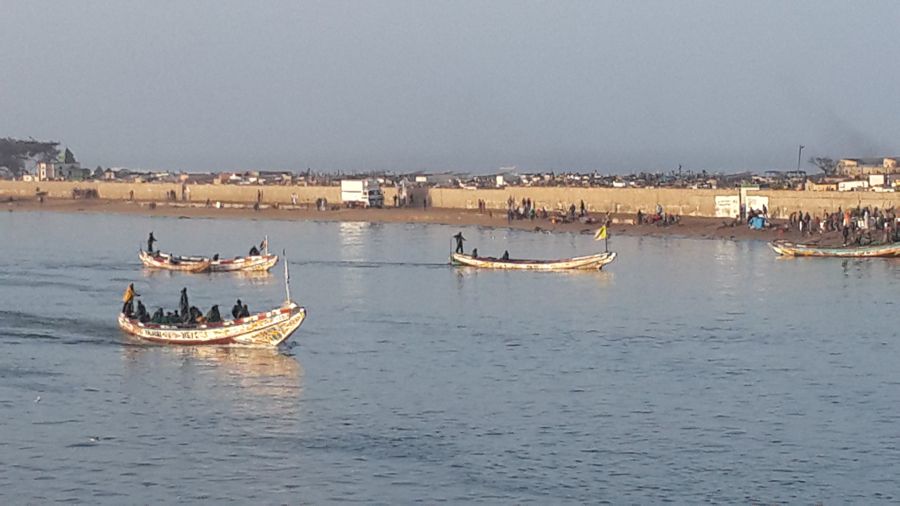
The morning sun was scarcely over the horizon and a cold wind was blowing
off the sands of the Sahel when I first saw them motoring up the steely,
smooth waters of the Senegal River: Senegal's artisanal fishing fleet, back
from a long night – or maybe several – in the cold waters of the
eastern Atlantic. A dozen wooden pirogues wended their way,
gracefully, past the island of Saint Louis where I watched them from a hotel
balcony, towards the tangled knot of ships and men that constitutes the
fishing port.
I watched them with a sense of appreciation. Other than the outboard
motor and the grey vinyl Wellington overcoats worn by the crew, not much of
that scene has changed in centuries, including the long, drawn out lines of
the pirogue itself, which was originally a river craft stretched out
and sent into the unforgiving ocean in search of bigger fish. After many
years of working among the highest levels of political leadership to
bring about meaningful reduction in Senegal's poverty, I watched these
traditional people going about their traditional craft in the traditional
way, and I thought to myself, "I haven't affected these folks in any
way at all." That's not totally true, of course: they're the rantings
of a frustrated bureaucrat impatient with the rate of progress and all the
insalubrious aspects of trusting political leaders to want and work towards
change.
Continue reading "When the Pirogues Return from Sea"
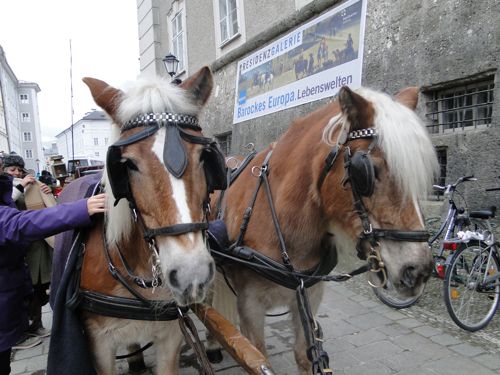
Salzburg was magical. Salzburg was lovely. Salzburg was freezing. I'm told the magic of Salzburg is in the hills, but we had trouble looking too far up, as the wind was out of the north and the snow flakes were falling in our eyes as we looked around.
We noticed one of the first miracles of European Union integration as we departed Innsbruck for Salzburg: our train almost immediately left Austria at the border at Kufstein, and traveled the rest of the way through Germany – endless fields buttoned up for the winter with rolls of hay stacked at the margins – before arriving. Imagine how different things were a few decades ago when Germany was divided and Austria represented the frontier and the Iron Curtain that demarked the two philosophies of the Cold War.
Continue reading "Salzburg"
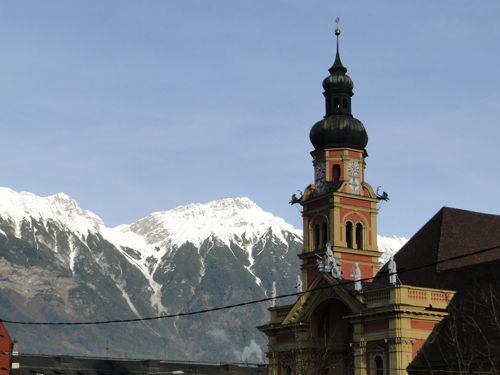
I'd hoped to learn all about the speckled history of Innsbruck, "the Bridge over the River Inn" in order to flesh out this story. In reality, between kids and work and other responsibilities, I never really got a chance to learn much at all about the place we spent Christmas of 2014.
That doesn't mean it hasn't earned a very special place in my heart, though:
Continue reading "Innsbruck"
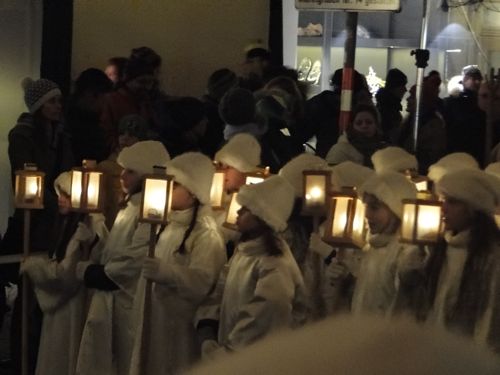
Christmas is different in every culture around the world, and while many of America's Christmas traditions come from Germany and Austria, that doesn't mean it's the same thing.
For one, in Austria, it's the Christ Child himself who delivers the gifts to good little children, not some bearded, Nordic fat man in a red suit. And we were lucky – not only did the Christ Child bring a gift or two for us while we stayed in Innsbruck, but we got a chance to see the lighted procession on Christmas Eve.
Continue reading "Christmas in Innsbruck"
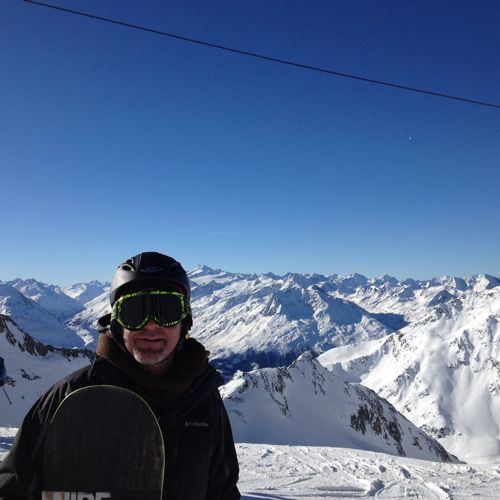
The kids wanted a white Christmas, sure, but I was also hoping our trip to Austria would yield a little snow. I was hoping to do a little snowboarding for the first time since we traveled to Sierra Nevada, and the second time since my 20s. But as we arrived in Innsbruck in Christmas week, it was beginning to look unlikely, and the forecast was cheerily focused on sun and seasonally warm temperatures.
"It doesn't matter," my Austrian friend said. "We'll just go up and ski the glacier."
My heart leapt.
Continue reading "The Stubaital Glacier"
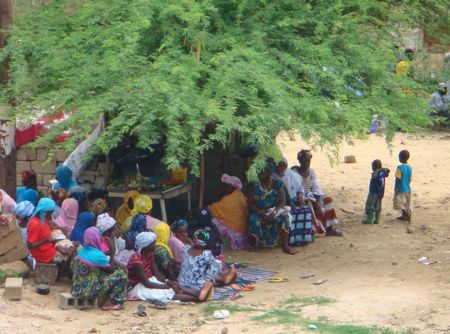
Intro: February 2012
Call it a lesson in the obvious, perhaps. I've had the pleasure of living
among squatters, and my eyes have been opened to what squatting really means in
West Africa. Our neighbors on two sides in Dakar have set up home on vacant,
yet-unbuilt lots. They are camps of families and acquaintances making their
homes on lots otherwise undeveloped. They organize themselves around sources of
water when they are available, keep their sheep, build small cooking fires,
socialize ... and then they are gone.
Continue reading "The Squatters"
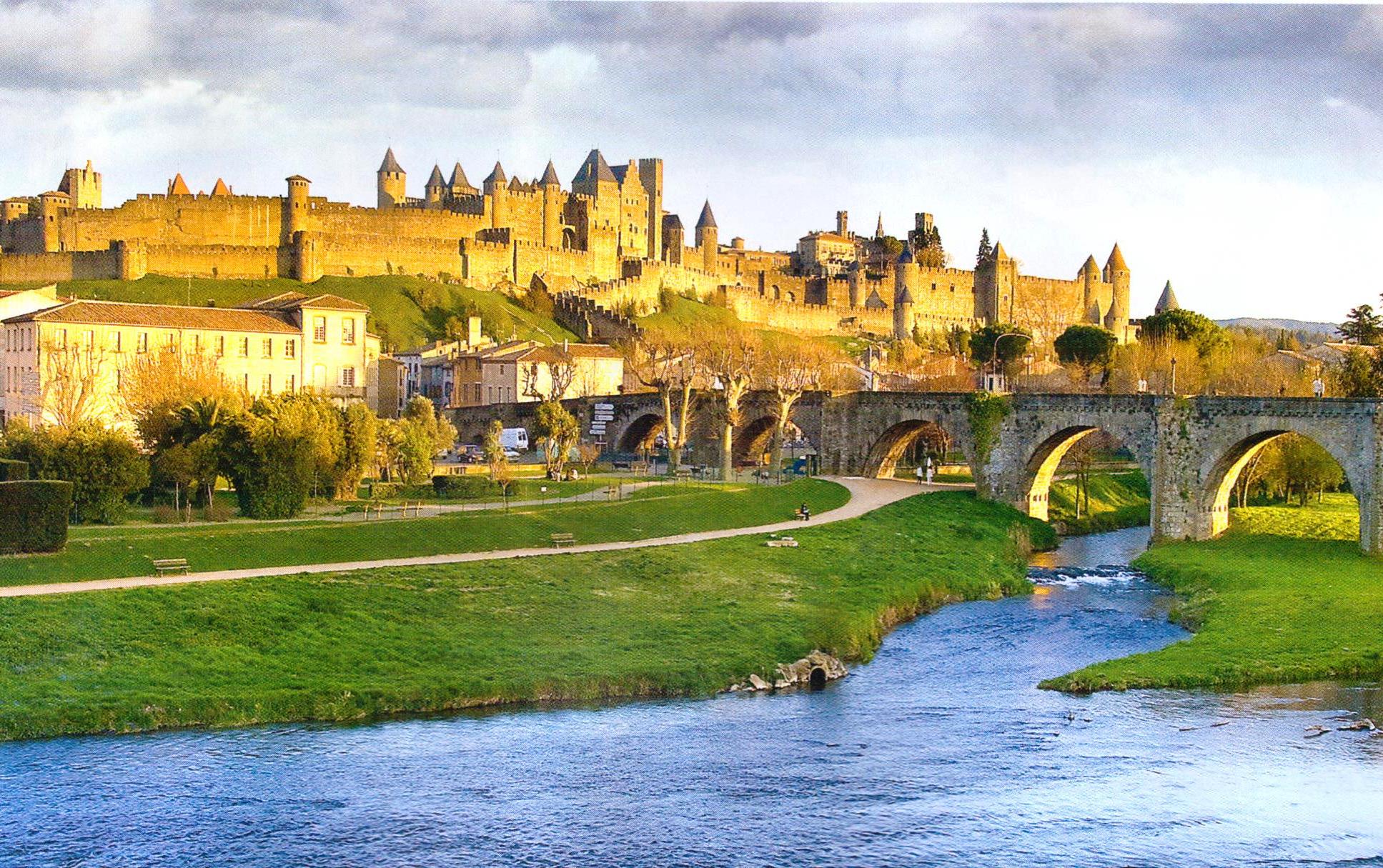
I had been wondering why castles and stories of knights and princesses so thoroughly captivate the kids, and decided it’s probably simply because such an industry has come up around those stories, and there’s so much money to be made. Then we visited Carcassonne and I decided there’s something else.
Neither Ericka nor I is a stranger to castles, having visited many over the past decade. But Carcassonne was captivating in ways that extended beyond the crenelated ramparts. I think it may have been the geography: from the streets of modern Carcassonne you travel outside the city limits, crossing a grassy plain to where the medieval fortress sits perched on a little hillock with a perfect view of the surrounding countryside. Never mind you’re traveling to the city gates in a 2012 Peugeot taxi blasting pop tunes through Bluetooth speakers, as you approach the city gates you’re horseback, wearing heavy leather boots and carrying a weapon of forged iron. And then you are there, on the outside looking in, separated from the inner sanctum of the walled city by a moat (now dry and grassy), and a real, many-ton drawbridge. Carcassonne.
Continue reading "The Walled City of Carcassonne"

Meet Albert, the best-known street dog in the Almadies neighborhood of Dakar, where we live, and the sire of probably hundreds of Dakarois puppies over the years (he's taking a well-deserved nap in this pic). He's undisputably the king of the neighborhood — even our Basenji warrior leaves him alone. As for the puppies, well his days of fatherhood came to an end, thanks to the intervention of a group of philanthropists and a program of street dog sterilization. But the whole story makes an instructive metaphor.
There's no question something needs to be done about all the underfed, fleabitten, miserable animals living a hairsbreadth from danger in the streets, gasping for shade under parked cars, scrounging through barrels, and generally living badly. And the Dakarois are scared mostly to death of dogs, so they are happy to have fewer of them. So when it comes time to develop and implement a street-dog sterilization campaign, how does it play out?
Continue reading "Albert and the Mutts: a lesson in poverty reduction"
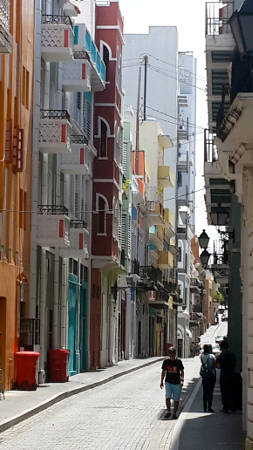
The best thing about the folks of San Juan, Puerto Rico is their accent: a lot of them sound like me. That is, they've got a New York accent. That changes everything. In fact, Puerto Rico is practically unique across the Caribbean for being an American territory with strong American connections but a culture and history rooted in the Spanish empire as well, and an island that reflects both.
Miguel took us across town in late morning. "Any earlier and the traffic will kill you," he explained. "It's bad and getting worse" We spent a good deal of time waiting to cross intersections anyway, gazing out at architecture that looked kind of like South Florida, but – amazingly – cleaner and better kept. But it was clear the island is struggling, ad we read it in the papers too: to call Puerto Rico's current situation as a 'slump' would be an understatement. That would explain the continued emigration to places like New York, where well over a million Puerto Ricans join the 3 million that stayed behind. "New York's Puerto Rican community is famous," Miguel explained, adding, "Know the other big center of Puerto Rican emigration? Orlando." And then with a smile and a strategic pause, " That's right: Mickey Mouse eats beans and rice"
Continue reading "San Juan, Puerto Rico"
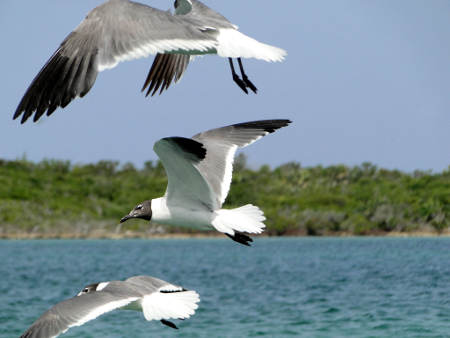
Turns out, good branding matters, even in geography. Don't believe me? Ask someone currently trying to get by while living in Dildo (Newfoundland and Labrador), Crapo (Maryland), Boogertown (North Carolina), Hellhole (Idaho), or Drain (Oregon). There are others, of course. So it is that the little stretch of sand and sea once known as Little San Salvador has done much better with the relatively more evocative name of Half Moon Cay. That's what I was thinking when I awoke to find our boat rocking gently at anchor off the sandy crescent of Caribbean goodness on which were to spend the rest of the day playing and exploring.
Continue reading "The Laughing Gulls: Little San Salvador"
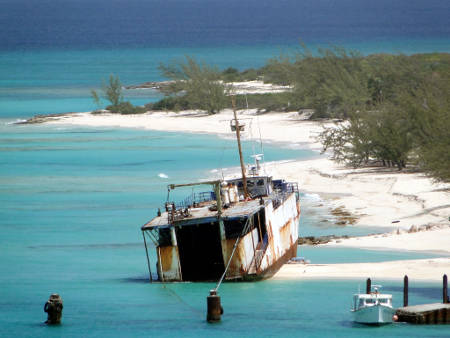
I only knew two things about the Turks and Caicos islands before traveling: one, that due to serious concerns about corruption and transparency, the United Kingdom had come close to throwing them out of the British Commonwealth and revoked their right to self government in 2009; and two, that by Caribbean geography alone, it was darned likely I'd find an aquatic paradise of white sand beaches, transparent, turquoise water, and bright sun. On both accounts, I was correct. But I learned a bit more, as well. And mostly, I learned it from Ernest Hemingway. Here, pour yourself a drink before reading on:
Thomas Hudson took a sip of the ice-cold drink that tasted of the fresh
green lime juice mixed with the tasteless coconut water that was still
so much more full-bodied than any charged water, strong with the real
Gordon’s gin that made it alive to his tongue and rewarding to swallow,
and all of it tautened by the bitters that gave it color. It tastes as
good as a drawing sail feels, he thought. It is a hell of a good drink.
Continue reading "Low, White Sand: the Turks and Caicos"
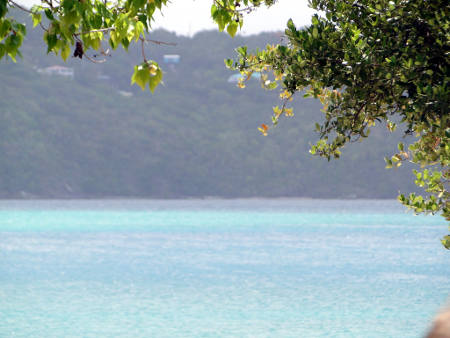
We raised Saint Thomas on the Caribbean horizon before dawn, and by the time the sun was rising, the air was full of bird calls and we were docked in the magnificent harbor of Charlotte Amalie. The Caribbean, the deep Caribbean! And one of the splendid Antilles Islands, to boot!
Continue reading "Rainfall in Saint Thomas"
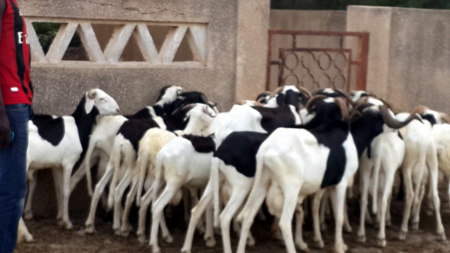
Today is Tabaski, the biggest festival of the year in Senegal. In Arabic it's Eid al-Adha (The Festival of Abraham), and commemorates the moment where, called by God to sacrifice his son Ismael, God sent a ram and Abraham sacrificed it instead of his boy. Muslims sacrifice a ram each year in remembrance.
You can tell Tabaski is coming because you see lots of sheep being transported back and forth: on the roofs of cars, hopefully trussed down under a rice sack, leaving them to admire the countryside, chewing their cud, as they whizz down the highway; also on motorcycles and not infrequently between the legs of the cyclist as he navigates Senegal's crazy traffic. You also start to see sheep tied up to a tree outside the richer households, where it's a not-so-subtle display of wealth and a frequent target of theft.
Continue reading "Run sheep, run!"
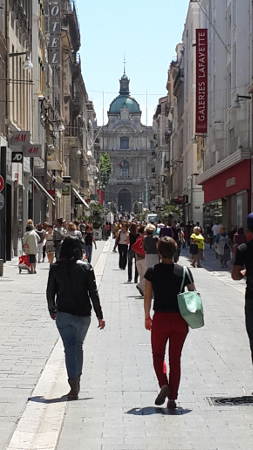
In grad school we studied at length the topic of economic convergence, where given freedom of labor movement and transport of materials, wages and economic conditions gradually meet in the middle, like high and low waters finding middle ground as the barrier falls. Agree with that theory or not, head directly to Marseille to have a look at what that might look like.
We visited Marseille in early summer, but already it was sweltering with Mediterranean heat; the air was humid and the sun seared, especially towards evening when its reflection off the harbor was nearly blinding. Hotter still was the metro, which was packed, nearly airless, and absolutely teeming with throngs and throngs of commuters. Suffocating, we curtailed our cross-town trip and made for the exits, where we caught one of the above-ground tramways plying the same route.
Continue reading "Marseille"
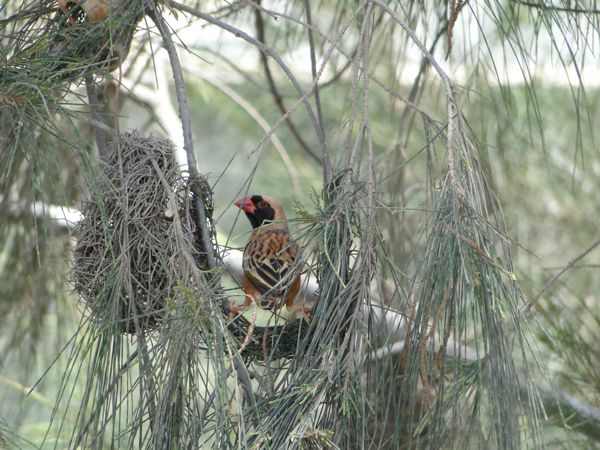
The Queleas arrived in mid-summer as the temperature in Dakar ramped up. Uninvited but hugely welcome, they have been an entertaining part of my mornings and evenings until the rains came and chased them away.
Chatty little things, several dozen Queleas began setting up shop in the Casuarina trees in our back yard, twisting and weaving bits of grass and needle into bowl-shaped nests that hung from the branches. They were so intensely chirpy that the neighbors complained, but what was not to like about so much energy and activity outside the windows? And their industry and perspicacity were a welcome respite from life in human West Africa.
Continue reading "The Queleas"
















